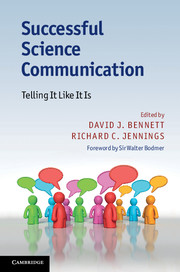Book contents
- Frontmatter
- Contents
- Foreword
- Authors' biographies
- Introduction Public engagement in an evolving science policy landscape
- Part I What it helps to know beforehand
- Part II Policy-makers, the media and public interest organisations
- Part III What you can do and how to do it
- 15 Building relations with the various groups
- 16 Finding the right words: how to shine in radio and television interviews
- 17 Nanotechnology and the media: front page or no story?
- 18 The power of the podcast: the Naked Scientists' story
- 19 The social web in science communication
- 20 Dealing with dilemmas and societal expectations: a company's response
- 21 Science festivals
- 22 Things to see and do: how scientific images work
- 23 The Triple Helix: the undergraduate student-run face of science communication
- 24 Public understanding of research: the Open Research Laboratory at the Deutsches Museum
- 25 Imagine: a communication project putting life sciences in the spotlight
- Part IV And finally, evaluating and embedding science communication
- Index
- Plate section
16 - Finding the right words: how to shine in radio and television interviews
Published online by Cambridge University Press: 05 May 2013
- Frontmatter
- Contents
- Foreword
- Authors' biographies
- Introduction Public engagement in an evolving science policy landscape
- Part I What it helps to know beforehand
- Part II Policy-makers, the media and public interest organisations
- Part III What you can do and how to do it
- 15 Building relations with the various groups
- 16 Finding the right words: how to shine in radio and television interviews
- 17 Nanotechnology and the media: front page or no story?
- 18 The power of the podcast: the Naked Scientists' story
- 19 The social web in science communication
- 20 Dealing with dilemmas and societal expectations: a company's response
- 21 Science festivals
- 22 Things to see and do: how scientific images work
- 23 The Triple Helix: the undergraduate student-run face of science communication
- 24 Public understanding of research: the Open Research Laboratory at the Deutsches Museum
- 25 Imagine: a communication project putting life sciences in the spotlight
- Part IV And finally, evaluating and embedding science communication
- Index
- Plate section
Summary
Before the eye-opening Bodmer Report activated the whole PUS movement, many (if not most) researchers tended to think of the media as a foreign country about which they knew or cared little. Its inhabitants were largely considered hostile, sensation-seeking and probably deeply unintelligent. Its outputs – be they in printed or electronic form – were frequently dismissed as superficial, unhelpful and often plain inaccurate.
These attitudes did not change overnight with the publication of the 1985 Report. Indeed, in some isolated corners, they still persist. But Bodmer did put in train some key, ecumenical ideas, namely:
The need to understand the importance of the media in making public what goes on behind the laboratory door, and which would otherwise remain unseen and unheard.
Urging researchers to get to know this hitherto alien culture, to learn its strange language, practices and behaviour.
Stressing that interacting with the media represents an opportunity to reach a far wider audience about scientific achievements, not an automatic threat to academic integrity.
- Type
- Chapter
- Information
- Successful Science CommunicationTelling It Like It Is, pp. 240 - 255Publisher: Cambridge University PressPrint publication year: 2011
- 1
- Cited by



